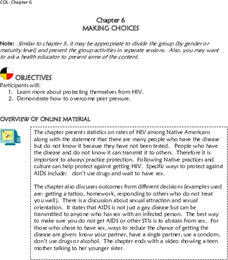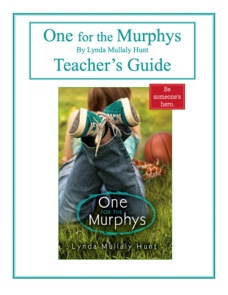Healthy Native Youth
Chapter 5: Learning About HIV/AIDS/STI's and Hepatitis Transmission
Middle schoolers delve deep into facts about HIV, AIDS, Hepatitis, and other STI's by way of discussion and a hands-on activity. Scholars ask and discuss questions anonymously using a Question Box. Two experiments showcase the...
Healthy Native Youth
Chapter 6: Making Choices
A lesson looks closely at risky behavior such as teen pregnancy and sexually transmitted diseases. Middle schoolers use a question box to ask questions anonymously. They role-play what life would be like if they became pregnant then...
Healthy Native Youth
Chapter 7: Revisiting the Circle of Life
Scholars revisit the Circle of Life to examine positive character traits—mental, physical, spiritual, and emotional. Pupils discuss how those character traits could help them make responsible decisions and not contract HIV/AIDS. Learners...
EngageNY
End of Unit Assessment: Presentation of Position
What is the difference between formal and informal language? Pupils rewrite their position speeches to adapt them for an audience of adults. Next, they present their speeches in small groups, attempting to answer the question, "Which...
EngageNY
Creating a Visual Component for the Speech: End of Unit Assessment Preparation and Practice
Eye contact, volume, pronunciation. Working with partners, scholars practice presenting their speeches about the best food chain. Additionally, they choose a visual component to support their end-of-unit speech.
Ashoka
A Toolkit for Promoting Empathy in Schools
Instill kindness with a unit all about empathy. Lessons and activities follow a prepare, engage, reflect, and action sequence. Learning experiences include making the classroom a safe environment, peer-invented handshakes, discussions...
University of Kansas
Feelings - Thematic Unit
Boost language skills with a unit all about feelings. Scholars from all grade levels take part in several lessons that incorporate specific vocabulary terms and adjectives while discussing their feelings with their peers. Reading...
Poetry4kids
How to Host an Open Mic Poetry Party
Four steps to Open Mic Night! The location, invitations, supplies, and party favors are all part of the process in planning and hosting a fun-filled gathering where scholars read aloud an original poem or one by their favorite author.
Arbor Day Foundation
Trees: A Joy Forever
This Arbor Day, put on a show! A three-scene play follows a boy and girl that run into Arbor Day founder, J. Sterling Morton. Morton describes how the holiday came to be and discovers how his hard work has grown into a national...
Penguin Books
One for the Murphys by Lynda Mullaly Hunt - Teacher's Guide
Children in foster care face a lot of uncertainty in their lives. A guide for the novel One for the Murphys introduces a main character, Carley, who is thrust into the foster care system. Chapter-by-chapter questions cover key details in...
Equality and Human Rights Commission
Diversity
Eighty-seven percent of people living in the United Kingdom identify as white, and some of those struggle to understand the importance of diversity in society. Scholars use presentations, discussions, and activities to address diversity...
Equality and Human Rights Commission
Taking Action
The Universal Declaration of Human Rights passed in 1948 when the majority of members of the United Nations voted in favor of the resolution. Scholars use their knowledge of human rights to determine ways they personally can help promote...
Equality and Human Rights Commission
How Do Human Rights Work?
Do human rights apply to children? Scholars learn of three children asking for help to determine their rights and how to handle specific situations. Class members must research any laws pertaining to the requested right and how the...
Equality and Human Rights Commission
Discrimination
Discrimination takes many forms, and lesson eight in the 12-part series addresses many types and their greater impact on society. The lesson uses a presentation, videos, news stories, and discussions to synthesize many different viewpoints.
Equality and Human Rights Commission
What Are Human Rights
What if, rather than being entitle to human rights, basic human rights had to be purchased? With a fixed income, what rights would you buy? How much would you be willing to pay for a particular right? to gain an understanding of the...
Equality and Human Rights Commission
Empathy
Scientists discovered empathy is a learned behavior, not an instinct or inherited behavior. The second lesson in a 12-part series focuses on teaching empathy, an important life skill. Scholars use discussion and role playing to practice...
California Department of Education
Safe at Work
From minimum wage to minimizing injuries, young workers need to know their rights! The sixth and final lesson in a series of college and career readiness activities gets eighth graders thinking about safety and labor laws.
California Department of Education
How to Succeed in Life
Is it possible that six simple traits lead to a happy, successful life? Part four of a six-part series of college and career readiness lessons examines the effects of character in determining success. Working groups discuss...
Carolina K-12
Affrilachia
What makes a culture unique? Learners research life in the Appalachia region of the United States. Poetry, music, and oral history create Affrilachia, the term used to describe the lifestyle of the area. African-American mountain culture...
BrainPOP
World History Lesson Plan: Uncovering Essential Questions
Have you ever noticed a news story revolves around an essential question? Scholars research methods of reporting historical events. Working in groups, they use an interactive module to gather information on a historical topic, uncovering...
Social Media Toolbox
Social Media Survey
Survey says ... social media is here to stay! How do the pupils in your school use social media? Using lesson four from a 16-part series, The Social Media Toolbox, learners study surveys and create their own. The resource includes...
Social Media Toolbox
Social Media Usage
Is there a difference in the way organizations present news via social media and in print? The third in a series of 16 lessons from The Social Media Toolbox explores news outlets and their delivery methods. Groups follow a story for a...
Social Media Toolbox
Why Social Media?
Is social media the best way to convey news in your school? Young journalists dig deep into the social media question in the second of 16 lessons from The Social Media Toolbox. After learning about the relationship between social media...
Social Media Toolbox
Ethical Decision Making
When faced with a dilemma, how do journalists decide how much news to use? Social media scholars explore the philosophies of ethical resolution in the first of a 16-part Social Media Toolbox series. Partnered pupils use a Potter Box to...

























